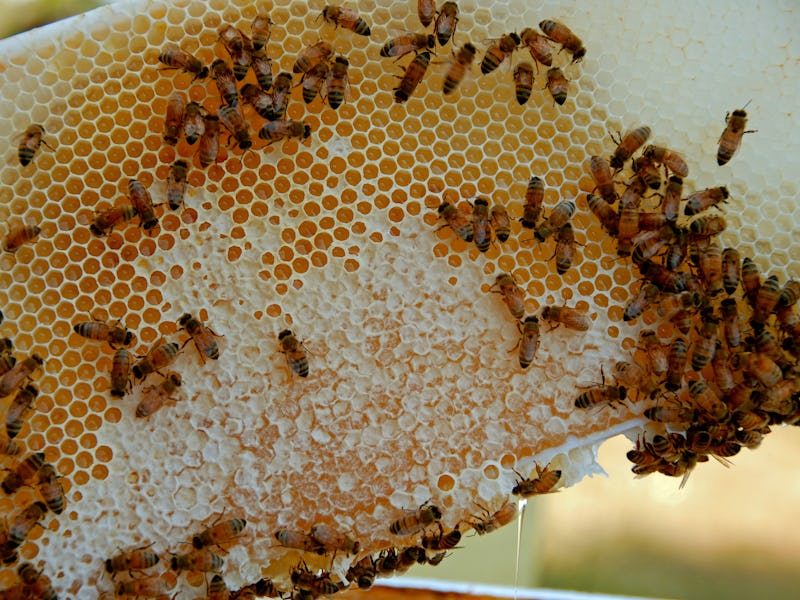Chill Out About 'Alarming' Honey Fears, Say Scientists
It's not quite time to ditch the honey.

Bee vomit, AKA honey, contains all sorts of stuff that bees pick up while foraging for nectar. This includes, as it turns out, a number of pesticides.
This week’s headlines have made this seem like bad and scary news: “Pesticides that pose threat to humans and bees found in honey,” wrote the Independent. “Honey tests reveal global contamination by bee-harming pesticides,” reported The Guardian, with only slightly less alarm. The BBC was perhaps the least panicked, reporting that “Pesticides linked to bee deaths found in most honey samples.” And while this is bad news for bees, it doesn’t necessarily mean that you need to swear off honey yet.
These headlines are all based on a study published Thursday in the journal Science, in which a team of researchers tested 198 honey samples from all over the world and found that 75 percent of them contained at least one out of five types of neonicotinoid pesticides— acetamiprid, clothianidin, imidacloprid, thiacloprid, and thiamethoxam.
Sure, these are pretty scary pesticides. If you don’t know, neonicotinoids are the class of systemic pesticides that are commonly used for agriculture and have been widely blamed for declining bee populations around the world. Systemic pesticides, which work by permeating plants that are treated with them, poison bees when the bees feed on the toxic nectar in plants that were treated with the neonicotinoids. Neonicotinoids have been shown to hurt cognition in bees, even when present at sub-lethal levels.
But just because neonicotinoids are dangerous to bees and just because they’re showing up in honey doesn’t mean your honey is dangerous.
Bees pick up neonicotinoid pesticides in nectar, and these chemicals make their way into honey produced by these bees. But it's not yet cause for alarm.
“Although 75% of samples tested positive for at least one neonicotinoid, concentrations were, in all cases, below the admissible limits for human consumption according to current EU and U.S. regulations,” write the authors of the study.
So yes, there are pesticides in honey, but no, they are not at dangerous levels.
“The implications of this new study for human health are unclear,” says Dave Goulson, a professor of biology at University of Sussex in the United Kingdom, in a statement provided to Inverse. “It demonstrates beyond doubt that anyone regularly eating honey is likely to be getting a small dose of mixed neurotoxins. In terms of acute (short-term) toxicity, this certainly won’t kill them and is unlikely to do measurable harm.” And he’s not the only one tempering potential fears about human exposure.
“The levels of these chemicals detected in honey are unlikely to be a hazard to human health as they are present at very low levels and below the limit authorised for human consumption,” wrote Chris Connolly, a neurobiologist at the University of Dundee in the United Kingdom, in a statement for the Science Media Centre.
That being said, though, it’s not clear what long-term exposure to neurotoxins like neonicotinoids does to mammals’ nervous systems. There is some evidence that neonicotinoids could have negative effects on developing brains.
In a study on in vitro neonatal rat neurons published in PLOS One in 2013, researchers showed that two of the neonicotinoids covered in the Science study, acetamiprid and imidacloprid, change the way that certain neurons fire.
“Therefore, the neonicotinoids may adversely affect human health, especially the developing brain,” wrote that study’s authors.
This is not to say that neonicotinoids are good or fine. The evidence is quite clear that this class of pesticides is bad for bees, and because so much of our modern agricultural systems depend on bees to pollinate crops, what’s bad for bees is bad for us. And in fact, the focus on bees and honey could miss the point that bees aren’t the only insects affected by neonicotinoids.
“Although bees have grabbed the limelight with regard to impacts of neonicotinoids, there is every reason to believe that they will be impacting all beneficial insects that live in or near farmland,” says Goulson.
So even though the world’s ecosystems may come crashing down around us in the coming years, this week’s study in Science is probably not enough reason to deprive ourselves of the sweet refuge that honey provides.
If you liked this article, check out this video of a flow hive that reinvents beekeeping.